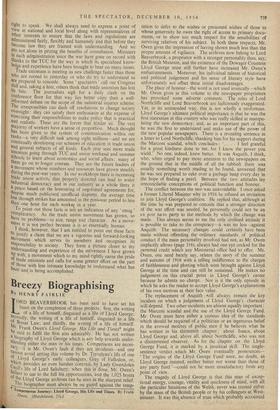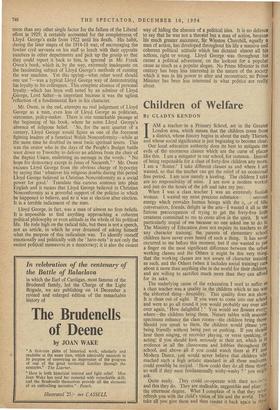Ilreezy Biographising
hy HENRY FAIRLIE 14 ORD EEAVERBROOK has been said to have set his heart on the completion of three projects : first, the writing of a life of himself, disguised as a life of Lloyd George; secondly, the writing of a life of himself, disguised as' a life of Sonar Law; and thirdly, the writing of a life of himself. Mr. Frank Owen's Lloyd George, His Life and Times* might be said to fulfil the first aim admirably. He has not written , a biography of Lloyd George which is any help towards under- standing either the man or his times. Comparisons are neces- sarY -it is Mr. Owen's fault if they are invidious--and one cannot avoid setting this volume by Dr. TreVelyan's life of one cl Lloyd George's early colleagues, Grey of Fallodon, or, which provides an even harsher contrast. by Lady Gwendolen Cecil's °life of Lord Salisbury; when this is done, Mr. Owen's farilure to use to the full his opportunities. and the 1,025 boxes 01 the Lloyd George archives an be seen in the sharpest relief. The biographer must always be on guard against the temp- ' Tempestuous Journey: Lloyd George, His Life and 'limes. By Frank
Owen. (Hutchinson. 25s.) • tation to defer to the wishes or presumed wishes of those to whose generosity he owes the right of access to primary docu- ments, or to show too much respect for the sensibilities of surviving relatives of his subject. In both these respects, Mr. Owen gives the impression of having shown much less than the proper amount of vigilance. The archives now belong to Lord Beaverbrook, a proprietor with a stronger personality than, say, the British Museum, and the existence of the Dowager Countess Lloyd George must still further have increased Mr. Owen's embarrassments. Moreover, his individual talents of historical and political judgement and his sense of literary style have unfortunately not offset these initial disadvantages.
The place of honour—the word is not used ironically—which Mr. Owen gives in this volume to the newspaper proprietors has provoked some adverse comment. The roles of Lord Northcliffe and Lord Beaverbroolc are ludicrously exaggerated. Yet, in its unintended way, this is not wholly a misfortune. Lloyd George's ultimate political importance is that he was the first statesman in this country who was 'really skilled at manipu- lating the new democracy; and, as an important part of this, he was the first to understand and make use of the power of the new 'popular newspapers. There is a revealing sentence in a letter to Lord Northcliffe; thanking him for his support during the Marconi scandal, which concludes : ' . . . . I feel grateful for a great kindness done to me, for I know the power you wield.' No one, indeed, knew better. it was Asquith. I think, who, when urged to pay more attention to the newspapers on the ground that in the middle of all the rubbish there was usually something worth reading to be found, answered that he was not prepared to rake over a garbage heap every day in the hope of finding a pearl. Between the two attitudes lay irreconcilable conceptions of political function and honour. The conflict between the two-was unavoidable. I once asked a former Liberal Minister why in 1916 he refused an invitation to join Lloyd George's coalition. He replied that, although at the time he was prepared to concede that a stronger direction of the war effort was needed, he personally could not be an ex post facto party to the methods by which the change wai made. This always seems to me the only civilised attitude it is possible to take to the conspiracy—it was no less--against Asquith. The necessary changes could certainly have been made without offending the ordinary standards of political conduct if the main personality involved had not, as Mr. Owen implicitly allows (page 316), always had one eye cocked for the personal credit which any Ministerial office had to offer. Mr. Owen, one need barely say, relates the story of the summer and autumn of 1916 with a telling indifference to the charges of faithlessness and plotting which were brought against Lloyd George at the time and can still be sustained. He makes no judgement on this crucial point in Lloyd George's career because he admits no charge. Nor is it the only episode in' which he asks the reader to accept Lloyd George's explanations of his own motives at their face value.
The replacement of Asquith will always remain the key incident on which a judgement of Lloyd George's character will depend. Two other incidents are almost equally important : the Marconi scandal and the use of the Lloyd George Fund. Mr. Owen must have either a curious idea of the standards which should be required of a politician or an ingenuous belief in the avowed motives of public men if he believes what he has written in his thirteenth chapter : about Isaacs. about Lloyd George and, above all, about Northcliffe, who was not a disinterested observer. As for the chapter on the Lloyd George Fund, it is marked by a jesuitical skill. The single-
sentence verdict _which Mr. Owen eventually pronounces- ' The origins of the Lloyd George Fund were, no doubt, as
Lloyd George insisted, neither better nor worse than those of any party fund '—could not be more unsatisfactory from any point of view. The tragedy of Lloyd George is that this man of excep- tional energy, courage, vitality and quickness of mind, with all
the particular Intuitions of the Welsh, never was trusted either by the mass of the British people or by his colleagues at West- minster. It was this,absence of trust which probably accounted more than any other single factor for the failure of the Liberal effort in 1929; it certainly accounted for the completeness of Lloyd George's exile from 1922 until his death. His habit, during the later stages of the 1914-18 war, of encouraging the lowlier civil servants on his staff to lunch with their opposite numbers in other departments and pick up the gossip so that they could report it back to him, is ignored in Mr. Frank Owen's book, which is, by the way, extremely inadequate on the fascinating subject of Lloyd George's methods of running the war machine. Yet this spying—what other word should one use ?—was a typical Lloyd George way of demonstrating his loyalty to his colleagues. This complete absence of personal loyalty—which has been well noted by an admirer of Lloyd George, Lord Salter—is important because it was the ugliest reflection of a fundamental flaw in his character.
Mr. Owen, in the end, attempts no real judgement of Lloyd George as a man, even less of Lloyd George as politician, statesman, policy-maker. There is one remarkable passage at the beginning of his book, where he notes Lloyd George's absence of religious belief. So, for the next quarter of a century, Lloyd George would figure as one of the foremost fighting leaders of a fanatical Welsh Nonconformity—while at the same time he doubted its most basic spiritual tenets. This was the orator who in the days of the People's Budget battle went down to Treorchy to deliver an address from the chair of the Baptist Union, enshrining its. message in the words : "No hope for democracy except in Jesus of Nazareth."' Mr. Owen excuses Lloyd George from the obvious charge of hypocrisy by saying that whatever his religious doubts during this period Lloyd George believed in Christian Nonconformity as a social power for good.' Translate this curious sentence into plain English and it means that Lloyd George believed in Christian Nonconformity as a powerful support of the policies in which he happened to believe, and so it was at election after election. It is a terrible indictment of the man.
Lloyd George, in fact, was a man of almost no firm beliefs. It is impossible to find anything approaching a coherent political philosophy or even attitude in the whole of his political life. He rode high on the radical tide, but there is not a speech, not an article, in which he ever dreamed of asking himself what the purpose of this radicalism was. To identify oneself emotionally and politically with the 'have-nots' is not only the easiest political manceuvre,in a democracy; it is also the easiest way of hiding the absence of a political idea. It is no defence to say that he was not a theorist but a man of action, because his much greater successor, Sir Winston Churchill, equally a man of action, has developed throughout his life a massive and coherent political attitude which has dictated almost all his actions, right or wrong. Lloyd George was throughout his career a political adventurer, on the lookout for a popular cause as much as a popular slogan. No Prime Minister in this century has been less interested in the nature of the society which it was in his power to alter and reconstruct; no Prime Minister has been less interested in what politics are really, about.









































 Previous page
Previous page